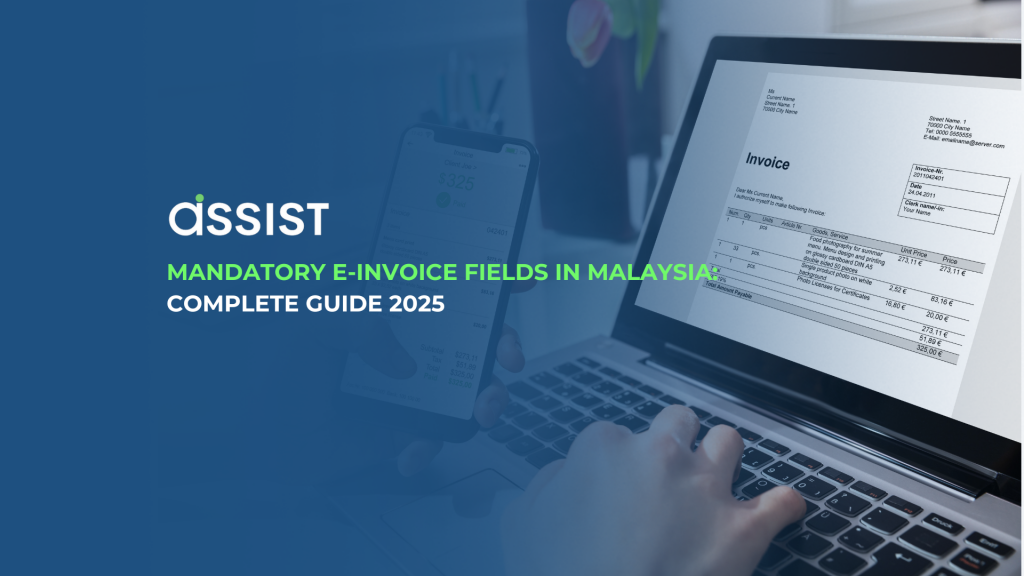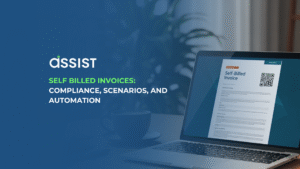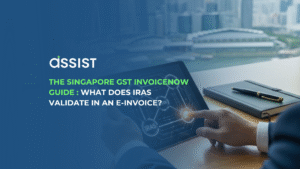Malaysia is embracing the digital age with the implementation of e-invoicing, a move aimed at enhancing tax compliance and streamlining business transactions. As businesses adapt to this new system, understanding the mandatory fields required in an e-invoice becomes crucial. This guide provides a comprehensive overview of these fields, ensuring your business stays compliant and efficient.
Table of Contents
ToggleSupplier Information
The supplier’s details form the backbone of an e-invoice. Accurate and complete information ensures transparency and trust in business transactions.
Mandatory Fields:
Supplier’s Name: The registered name of your business.
Tax Identification Number (TIN): Assigned by the Inland Revenue Board of Malaysia (IRBM).
Registration/Identification Number: Business registration number or identification number for individuals.
SST Registration Number: If applicable, your Sales and Service Tax number.
Tourism Tax Registration Number: For businesses in the tourism sector.
Email Address: A general email for correspondence.
MSIC Code: Malaysia Standard Industrial Classification code representing your business activity.
Business Activity Description: A brief description of your business operations.
Address: Your business’s physical address.
Contact Number: A reachable phone number for inquiries.
Real-life Example:
Imagine a bakery named “Sweet Treats Sdn Bhd” issuing an e-invoice. They must include their registered name, TIN, business registration number, SST number (if registered), email (e.g., info@sweettreats.com), MSIC code for bakery operations, a description like “Manufacture of bread and cakes,” their business address, and contact number.
Buyer Information
Capturing accurate buyer information is essential for record-keeping and tax purposes.
Mandatory Fields:
Buyer’s Name: The registered name of the purchasing entity.
TIN: Buyer’s Tax Identification Number.
Registration/Identification Number: Business registration number or personal identification number.
SST Registration Number: If the buyer is SST-registered.
Email Address: For sending the e-invoice.
Address: The buyer’s official address.
Contact Number: For any follow-up communication.
Practical Advice:
Always verify the buyer’s TIN and registration numbers against official documents to prevent errors. Maintaining a standardized form for collecting this information can streamline the process.
Invoice Details
The core of the e-invoice lies in its detailed breakdown of the transaction.
Mandatory Fields:
e-Invoice Version: The version of the e-invoice format used.
e-Invoice Type: Indicates if it’s an invoice, credit note, etc.
e-Invoice Code/Number: A unique identifier for the invoice.
Original e-Invoice Reference Number: For credit or debit notes, referencing the original invoice.
Date and Time of Issuance: When the invoice is generated.
Digital Signature: Ensures authenticity and integrity.
Invoice Currency Code: Currency used in the transaction.
Currency Exchange Rate: If dealing with foreign currencies.
Frequency of Billing: Indicates if the billing is recurring.
Billing Period: The time frame the invoice covers.
Explanation:
Each field serves a specific purpose. For instance, the digital signature, provided by LHDN, authenticates the invoice, while the billing period clarifies the duration of services or goods provided.
Product and Service Details
Detailed descriptions of products or services ensure clarity and prevent disputes.
Mandatory Fields:
Classification: Category of the product/service.
Description: Detailed information about the item or service.
Unit Price: Cost per unit.
Tax Type: Applicable taxes (e.g., SST).
Tax Rate: Percentage of tax applied.
Tax Amount: Calculated tax based on the rate.
Tax Exemption Details: If applicable, reasons for tax exemption.
Amount Exempted from Tax: The exempted amount.
Subtotal: Total before tax.
Total Excluding Tax: Sum before tax is added.
Total Including Tax: Final amount after tax.
Importance:
Accurate product/service information ensures proper taxation and helps in inventory and financial management.
Tax and Payment Information
Proper tax and payment details are vital for compliance and financial tracking.
Mandatory Tax Fields:
Tax Type: Specifies the kind of tax applied.
Tax Rate: The rate at which tax is applied.
Tax Amount: Total tax calculated.
Optional Payment Fields:
Payment Mode: Method of payment (e.g., bank transfer, credit card).
Supplier’s Bank Account Number: For receiving payments.
Payment Terms: Agreed terms between buyer and supplier.
Payment Amount: Total amount to be paid.
Payment Date: When the payment is due or made.
Payment Reference Number: For tracking payments.
Bill Reference Number: Internal reference for billing.
Note:
While some payment fields are optional, including them can facilitate smoother transactions and record-keeping.
Shipping and Additional Information
For transactions involving physical goods, shipping details are crucial.
Mandatory Shipping Fields (if applicable):
Shipping Recipient’s Name: Who will receive the goods.
Shipping Address: Where the goods are to be delivered.
Shipping Recipient’s TIN: For tax purposes.
Registration/Identification Number: Of the recipient.
Additional Fields for Imports/Exports:
Customs Form Reference Number: For customs documentation.
Incoterms: International commercial terms defining responsibilities.
Additional Information:
Including comprehensive shipping and additional details ensures compliance with customs regulations and smooth delivery processes.
Conclusion
Understanding and accurately completing the mandatory fields in Malaysia’s e-invoicing system is essential for legal compliance and efficient business operations. By ensuring all required information is correctly filled out, businesses can avoid penalties and streamline their invoicing processes.
Need Assistance?
Navigating the complexities of e-invoicing can be challenging. Let Assist.biz simplify the process for you. Our expert solutions ensure your e-invoices are compliant and efficiently
Frequently Asked Questions (FAQ)
What are the mandatory fields in an e-invoice in Malaysia?
Mandatory fields include supplier and buyer details (names, TINs, addresses), invoice information (type, number, date, digital signature), product/service descriptions, tax breakdown, and shipping details if applicable.
Why are mandatory fields important in Malaysia's e-invoice system?
They ensure the invoice is valid under LHDN’s MyInvois system, support tax compliance, and help streamline digital auditing and reporting.
Who needs to comply with Malaysia’s e-invoicing regulations?
All businesses registered in Malaysia will eventually need to adopt e-invoicing, starting with large taxpayers and expanding to SMEs by mid-2025, as mandated by the LHDN.
Is there a specific format or template for Malaysia’s e-invoice?
Yes. The LHDN provides structured guidelines for e-invoice formats, which include specific fields that must be filled out. PEPPOL-compliant solutions like Assist.biz support this format.
What happens if my e-invoice is missing a mandatory field?
If any required fields are missing or incorrect, the e-invoice may be rejected by the MyInvois system, potentially resulting in compliance issues or delayed payments.




